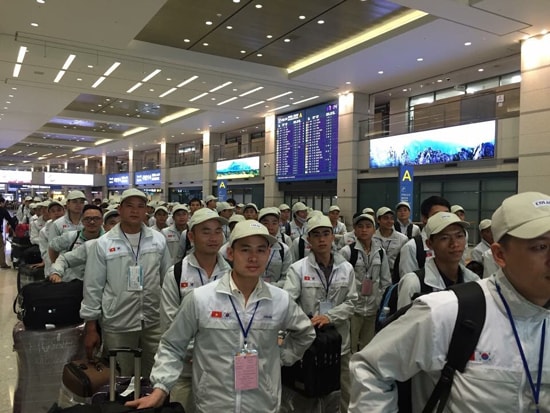Nghi Loc has nearly 360 illegal residents in Korea.
(Baonghean.vn) - When will Nghi Loc's ban on exporting labor to South Korea be lifted when there are still 358 people residing illegally in this country?
The orange makes the tangerine suffer.
I met Nguyen Thanh Long (22 years old) on a day at the end of April, in a dilapidated house facing the sea. It had been a month since the Ministry of Labor, War Invalids and Social Affairs announced that 58 districts were banned from exporting labor under the EPS program to Korea in 2017. But Long said that he was still disappointed after receiving this "sad news". Although it was not unexpected.
Long did not know what to do now, because he had prepared almost everything for going to Korea to work since he was still in school. He had not paid off a single penny of the money he owed the bank to prepare for going abroad.
Long’s dream for a long time was to go to Korea to work, earn money to help his family build a more spacious house, and have a better life. But that dream of getting rich still did not come true, although it was not the fault of this hard-working young man.
In 2017, along with 10 other localities in Nghe An, Nghi Loc district of Long "made a record" by being banned from exporting labor to South Korea for the second consecutive time because the number of illegal residents there exceeded 60 people.
Perhaps even the most optimistic people do not dare to confirm when Nghi Loc will have this “ban” lifted. While as of the end of February 2017, this locality still has 358 illegal residents, “honorably” leading among districts/cities in Nghe An. Compared to 58 localities nationwide, this number of Nghi Loc is only behind Nghi Xuan district (Ha Tinh), with 482 people.
 |
| Illegal residents are depriving those who come after them of the opportunity to work. Illustrative photo. |
Nguyen Thanh Long is just one of thousands of people with legitimate needs to go to Korea to work who are having to endure such injustice. They are paying for things they did not do. There are cases where they spent hundreds of millions of dong on vocational training, language classes, exams, brokerage fees, etc. but then were not allowed to leave the country simply because their locality was put on a “blacklist”.
Currently, the rate of Nghe An workers whose contracts have expired but do not return home but stay to work illegally still accounts for nearly 43% in Korea.
This problem has caused a bad image of Vietnamese workers in general and Nghe An province in particular. Forced the neighboring country to reluctantly issue bans.
Returning runaway workers are welcomed as "heroes"
Since 2005, the Government has issued Decree 141, clearly stating that absconding and not returning home according to the labor contract are prohibited acts when working abroad. According to this regulation, after having taken measures in the host country, the absconding workers are allowed to return home, the local authorities must be responsible for imposing penalties to maintain the reputation of the labor market. However, the implementation of the Decree still has many shortcomings.
In fact, there is a situation where many workers run away, residing illegally for many years, when they feel "rich enough" or old enough, they return home and almost do not encounter any obstacles. At this time, most local authorities do not have any deterrent actions, despite the Decree.
Many places even welcome them and consider them “heroes” because they bring money back to invest, build their hometowns, and help stabilize their economic lives. Meanwhile, in terms of law, workers in districts banned from going to Korea can sue those who have fled, because they indirectly reduced their job opportunities, although these lawsuits have not yet had precedent.
While illegal workers in Korea still receive high salaries because employers do not have to pay brokerage fees, the number of workers who run away and do not return home according to their contracts is expected to increase.
Because of the temptation of money, they ignore risks such as becoming victims of labor trafficking, exploitation, and unpaid wages...
To avoid the risk of losing this high-income market, it is time for state management agencies to take specific measures to reduce the rate of illegal labor./.
Tien Hung
| RELATED NEWS |
|---|
